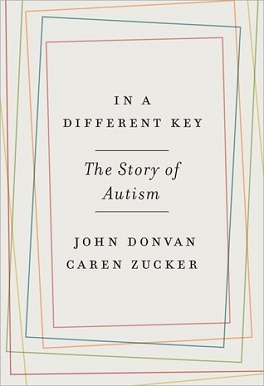In a Different Key
[[File:
In a Different Key is a documentary film that explores the history and controversies surrounding autism, a complex developmental disorder that affects communication and behavior. The film delves into the evolution of autism from its first diagnosis to the present day, highlighting the changing perceptions, treatments, and advocacy efforts associated with the condition. Through a series of interviews with individuals on the autism spectrum, their families, researchers, and advocates, In a Different Key aims to shed light on the challenges and triumphs of the autism community.
Synopsis[edit | edit source]
In a Different Key traces the history of autism from its initial identification by Leo Kanner in 1943, through the dark era of institutionalization and the dehumanizing treatments that were once commonplace, to the emergence of the neurodiversity movement and the fight for acceptance and rights for those on the spectrum. The documentary highlights key moments in autism history, such as the debunked theory linking vaccines to autism and the impact of this misinformation on public health.
The film also explores the concept of neurodiversity, a perspective that regards autism and other neurological conditions as natural variations of the human brain rather than disorders to be cured. Through personal stories, In a Different Key illustrates the diverse experiences of those living with autism, emphasizing the importance of understanding, acceptance, and support.
Themes[edit | edit source]
The documentary addresses several major themes, including:
- The evolution of autism diagnosis and treatment over the years.
- The impact of societal perceptions and stigma on individuals with autism and their families.
- The importance of advocacy and the movement towards acceptance and inclusion.
- The diversity within the autism spectrum and the challenges of generalizing the autism experience.
Reception[edit | edit source]
In a Different Key has been praised for its comprehensive exploration of autism and its efforts to humanize the experiences of those on the spectrum. Critics have highlighted the film's balanced approach to controversial topics and its ability to educate viewers while fostering empathy.
Impact[edit | edit source]
The documentary has contributed to ongoing conversations about autism, encouraging greater awareness and understanding of the condition. It has also served as a tool for advocacy, highlighting the need for policies and practices that support the autism community.
See Also[edit | edit source]
Search WikiMD
Ad.Tired of being Overweight? Try W8MD's physician weight loss program.
Semaglutide (Ozempic / Wegovy and Tirzepatide (Mounjaro / Zepbound) available.
Advertise on WikiMD
|
WikiMD's Wellness Encyclopedia |
| Let Food Be Thy Medicine Medicine Thy Food - Hippocrates |
Translate this page: - East Asian
中文,
日本,
한국어,
South Asian
हिन्दी,
தமிழ்,
తెలుగు,
Urdu,
ಕನ್ನಡ,
Southeast Asian
Indonesian,
Vietnamese,
Thai,
မြန်မာဘာသာ,
বাংলা
European
español,
Deutsch,
français,
Greek,
português do Brasil,
polski,
română,
русский,
Nederlands,
norsk,
svenska,
suomi,
Italian
Middle Eastern & African
عربى,
Turkish,
Persian,
Hebrew,
Afrikaans,
isiZulu,
Kiswahili,
Other
Bulgarian,
Hungarian,
Czech,
Swedish,
മലയാളം,
मराठी,
ਪੰਜਾਬੀ,
ગુજરાતી,
Portuguese,
Ukrainian
Medical Disclaimer: WikiMD is not a substitute for professional medical advice. The information on WikiMD is provided as an information resource only, may be incorrect, outdated or misleading, and is not to be used or relied on for any diagnostic or treatment purposes. Please consult your health care provider before making any healthcare decisions or for guidance about a specific medical condition. WikiMD expressly disclaims responsibility, and shall have no liability, for any damages, loss, injury, or liability whatsoever suffered as a result of your reliance on the information contained in this site. By visiting this site you agree to the foregoing terms and conditions, which may from time to time be changed or supplemented by WikiMD. If you do not agree to the foregoing terms and conditions, you should not enter or use this site. See full disclaimer.
Credits:Most images are courtesy of Wikimedia commons, and templates, categories Wikipedia, licensed under CC BY SA or similar.
Contributors: Prab R. Tumpati, MD

